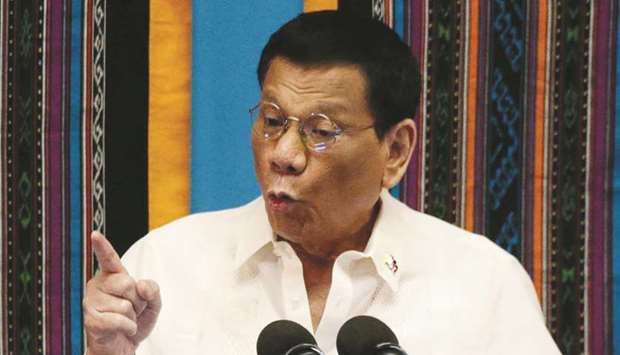Philippine President Rodrigo Duterte urged lawmakers yesterday to bring back the death penalty as part of his internationally-condemned crackdown on narcotics in which police have already killed thousands.
Buoyed by exceptionally high approval ratings and a legislature dominated by his allies, Duterte used his annual State of the Nation address to urge action on a key unrealised plank of his tough-on-crime stance.
“I respectfully request congress to reinstate the death penalty for heinous crimes related to drugs as well as plunder,” he said referring also to the nation’s deep-rooted corruption problem.
“My countrymen, it is a sad commentary that we cannot distinguish our need from our greed, our principles from prejudices,” he told hundreds of assembled lawmakers, diplomats and celebrities in Manila.
Amnesty International immediately warned over the proposal’s impact on a nation where police claim to have killed more than 5,300 drug suspects, but activists say the true toll is at least four times higher.
“Talk of bringing back the death penalty for drug-related crimes is abhorrent, and risks aggravating the current climate of impunity,” Amnesty section director in the Philippines Butch Olano said.
Though Duterte’s campaign is the subject of a recently launched review by the United Nations’ rights body and a preliminary inquiry from International Criminal Court (ICC) prosecutors, he was defiant in his address.
“Duterte — extrajudicial killing — report to the ICC,” he said. “If you can provide me with a good comfortable cell, heated during winter time...we can understand each other.”
In May’s mid-term elections Duterte backers won control of the Senate, which had stopped cold some of his most controversial proposals, such as bringing back capital punishment.
However, his allies, including the daughter of deceased former dictator Ferdinand Marcos and the first head of Duterte’s drug war, have voiced support for the death penalty.
Just as the president began his 90-minute address, he pointed to the popular support that underpins his rule, which faces censure for locking up detractors and attacking critical journalists.
“The latest survey results shows that my disapproval rating is 3%,” he said to applause. It “inspires me with determination to pursue relentlessly what we have started.”
Duterte reiterated that his zero tolerance for corruption remains the key policy of his administration.
“I have fired or caused the resignation of more than a hundred officials and appointees of government without regard to relationship, friendship and alliance. There is no sacred cow, as the saying goes, in my administration,” he said.
The president said he was “grossly disappointed” over the alleged misuse of state health insurance funds on “ghost” dialysis treatments, which he said proved that corruption is pervasive.
A former employee of WellMed Dialysis and Laboratory Centre in Quezon City last month revealed that the clinic made payment claims for dead patients from the Philippine Health Insurance Corporation from 2016 to 2018.
“Huge amounts of medical funds were released to cover padded medical claims and imaginary treatment of ghost patients. The government has been conned of millions of pesos, which could be used to treat illnesses and, possibly, save the lives of many,” he added.
Last week, Duterte placed 64 personnel of the Bureau of Customs under floating status because of their supposed link to corruption.
“I fight corruption still until now. However, much is to be done in ensuring our responsiveness to the people’s needs, based on the complaints received by this contact centre Bayan,” he said.
He again urged the public to make a scene or file complaints against officials who were not doing their job or were extorting money.
Complaints against government officials or agencies can also be relayed through the hotline 8888.
In July 2016, the Duterte administration launched the 8888 hotline after the president issued Executive Order 6, institutionalising 8888 as the Citizens’ Complaint Centre.

President Rodrigo Duterte gestures during his fourth State of the Nation Address at the Philippine Congress in Quezon City, Metro Manila, yesterday.
